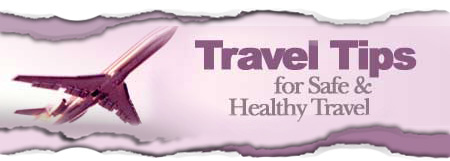| 
How to Prevent Air Travel Injury & Sickness
Each
year millions of Americans travel abroad. Each year, approximately 60
million international passengers traveled by air from the United
States annually. Over a third of them traveled to developing
countries, where the risk of contracting infectious diseases
is higher. About half of international travelers get sick or
injured during trips. In 2002, 849 cases of malaria
reported to CDC were related to travel overseas. Of the approximately
400 cases of typhoid fever each year in the U.S., 70% are related
to trips abroad. In 1997, 40% of all preventable deaths of U.S.
citizens abroad were due to injuries.
The
good news is that most travel-related sickness and injury can
be prevented. You are likely to be a traveler who has an enjoyable
trip free from illness or injury when you follow these tips:
1.
Be informed: Learn about travel health risks and what to do to
avoid them before your trip.
2.
Be ready: Get any vaccinations
(shots) or medicines that you will need for your trip.
3.
Be
smart while you travel: Make sure you follow
travel safety tips while you are on your trip. |
1.
Be Informed
Four
to 6 weeks before your trip find out what you need to know about
staying healthy and safe in the area where you are traveling
by visiting the Travelers'
Health website. Using the site is simple. Choose
the destination
(by region) you are traveling to and you will get information
about:
-
disease and safety risks and how to avoid them
-
special notices about
outbreaks or other disease activity
-
what vaccinations (shots) or preventive
medications (prophylaxis) you should or will be required to go.
|
Important:
some countries require you to show them a certificate
that says you have had a yellow fever vaccination before
you can enter. Only registered healthcare providers can
give the yellow fever vaccine.
If
you are pregnant
or traveling with children, traveling with pets,
or if you are a traveler with special needs, do not forget
to read the specific advice CDC has for you. |
If you are going on a cruise, see our cruise
ship travel recommendations from the Vessel Sanitation
Program.
For health-care providers, textbook-style information is also
available in the CDC publication, Health Information for International
Travel, also known as the "Yellow
Book". The 2003-2004 edition includes a new
chapter on traveling with children, new text on scuba diving
and high-risk travelers, new recommendations on malaria prophylaxis
and yellow fever vaccination, and expanded text on altitude
sickness, to name a few.
2.
Be ReadyIf
you will need any vaccinations (shots) or medicines, go to your
healthcare provider or clinic 4 to 6 weeks before your trip. This
will give your shots time to work so that you will be protected
during your trip. If it is less than four weeks before you leave,
you should still see your doctor. It might not be too late to
get your shots or medications.
Prepare a traveler's
health kit so you have all the medications and supplies
you may need before you go.
2.
Be Ready
-
Wash
your hands often and well with soap and water or an alcohol-based
hand rub to help kill germs, especially before eating! If
you are going on a cruise, read this fact
sheet about handwashing, too. (in Adobe PDF format)
-
Drink
only boiled or bottled water or soft drinks from sources you trust. Do not drink
tap water, fountain drinks, or eat ice cubes.
-
Only
eat food that has been cooked all the way through or fruits and vegetables that
have been washed and peeled. Remember: boil it, cook it, peel it, or forget it.
-
If
visiting an area where you might get malaria, make sure to
take your malaria
prevention medication before, during, and after
your trip, as directed.
-
If
you might be bitten by insects use insect repellent
with up to 50% DEET. The label on the container will tell you the
DEET content.
-
Make
sure you know how to keep yourself from being injured
while you travel.
Follow
the tips and recommendations your healthcare provider and the CDC Travelers' Health
site offer, and you are more likely to remain healthy and safe, so you can enjoy
your time away from home. Happy traveling!
| Top
Travel Tips |
| Wash
your hands frequently with with soap and water or an alcohol-based hand rub, especially
before eating. |
| Drink
only boiled or bottled water or carbonated drinks from sources you trust. Avoid
tap water, fountain drinks, and ice cubes. |
| Eat
only fully cooked food or fruits and vegetables you have peeled. Remember: boil
it, cook it, peel it, or forget it! |
| Wash
your hands frequently with with soap and water or an alcohol-based hand rub, especially
before eating. |
| If
visiting an area where there is risk for malaria, take malaria
prevention medication before, during, and after your trip, as directed. |
| If you might
be bitten by insects (like mosquitoes or ticks) use insect repellent (bug spray)
with up to 50% DEET. |
| Know
what to do to prevent
injuries during your trip. |
|